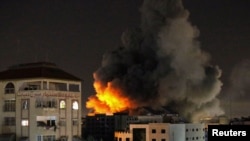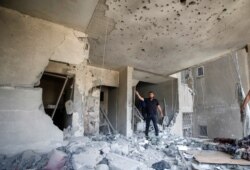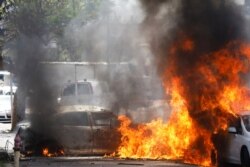Israel launched more airstrikes on Gaza early Tuesday, hitting the high-rise home of a Hamas field commander. Militants fired more than 250 missiles at Israel, killing two women, the first Israeli casualties in the current violence.
At least 28 Palestinians, including nine children, have been reported killed in Gaza.
With the Israeli deaths, along with 10 injuries, Prime Minister Benjamin Netanyahu said officials have decided to "increase both the strength and rate of the strikes" on the Gaza Strip against the militant groups Hamas and Islamic Jihad.
"Hamas will receive blows now that it didn't expect," he said.
Hamas fired some of the rockets minutes after a 6 p.m. local deadline had passed Monday evening that had been given to Israel to pull its security forces from the al-Aqsa Mosque compound in Jerusalem’s Old City. Frequent clashes have erupted in recent days at the compound, which Jews consider their holiest site and Muslims their third most important.
As tensions and armed clashes mounted, the Israeli military said it is sending troop reinforcements to the Gaza border and mobilizing 5,000 reserve soldiers.
At times, over the past decades, fighting between Israel and Hamas, the group that rules Gaza, has lasted for a few days. But now, Israeli Prime Minister Benjamin Netanyahu has warned that fighting could "continue for some time." An Israeli military spokesman told reporters Tuesday that the military was in "the early stages" of strikes against Gaza targets.
More than 700 Palestinians have been hurt fighting in the contested city of Jerusalem and across the West Bank. Hundreds of residents in Arab communities across Israel staged overnight protests against recent actions of Israeli security forces against Palestinians.
Netanyahu said Hamas crossed a “red line” with the rocket attacks. It is believed to be the first time the group fired rockets toward Jerusalem since a 2014 war.
“Israel will respond very forcefully. We will not tolerate attacks on our territory, our capital, our citizens and our soldiers. Whoever strikes us will pay a heavy price,” he said.
A spokesman for Hamas’ military wing, Abu Obeida, said the rocket attacks were a response to what he called Israeli “crimes and aggression” in Jerusalem.
What sparked the violence
The recent violence follows weeks of mounting tensions and confrontations between Palestinians and Israeli troops in the city, sparked in part by Israeli plans to carry out evictions of Palestinian families in a neighborhood of east Jerusalem.
A lawsuit over the evictions has reached Israel’s Supreme Court. However, the court postponed a key ruling in the case Monday, citing the “circumstances.”
To avoid the clashes, Israeli organizers of a march to celebrate the Jewish state’s 1967 capture of east Jerusalem altered its parade route to avoid the Muslim Quarter of the Old City.
Israel considers all of Jerusalem as its unified capital. The Palestinians want east Jerusalem to be the capital of a future state.
Reaction
U.S. Secretary of State Antony Blinken said that he was “deeply concerned about the rocket attacks” on Israel and that they should stop “immediately.”
“All sides need to de-escalate, reduce tension, take practical steps to calm things down,” he said in brief remarks ahead of a meeting with Jordanian Foreign Minister Ayman Safadi at the State Department.
Safadi said that “maintaining peace and stability in Jerusalem is key” and that the focus is to ensure that escalation stops.
White House press secretary Jen Psaki said Monday that the Biden administration is closely monitoring the situation in Israel and that it has serious concerns about the escalating violence.
Late Tuesday afternoon, pro-Palestinian demonstrators marched down Constitution Avenue in Washington.
British Foreign Secretary Dominic Raab condemned the rocket attacks, saying, “The ongoing violence in Jerusalem and Gaza must stop. We need an immediate de-escalation on all sides.”







